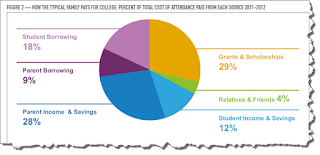Above Average in Student Loan Debt?

The numbers are out for the class of 2011 and two-thirds of the graduating class graduated in debt. If you are an average borrower, you owe $26,600, exceeding the class of 2010 by 5%, Was it worth it? In 2011, the unemployment for college graduates was 8.8% while unemployment of high school graduates was at 19.1% so the employment number would say yes. So you decide to go to college. How do you reduce the amount of money you will borrow, have a good time, and graduate? Here are a few ideas. 1. Graduate on time or early. An extra year of college can cost you can $50,000 or more. To calculate the cost of that extra year, add your tuition, fees and books to your potential starting salary. Say that your tuition, book, and fees are $20,000 and your starting salary is $30,000; that extra year cost you $50,000. This number could be higher or lower depending on where you attend college and your career. Just for fun, calculate your own cost of an extra year of college. If you were to graduate ...







